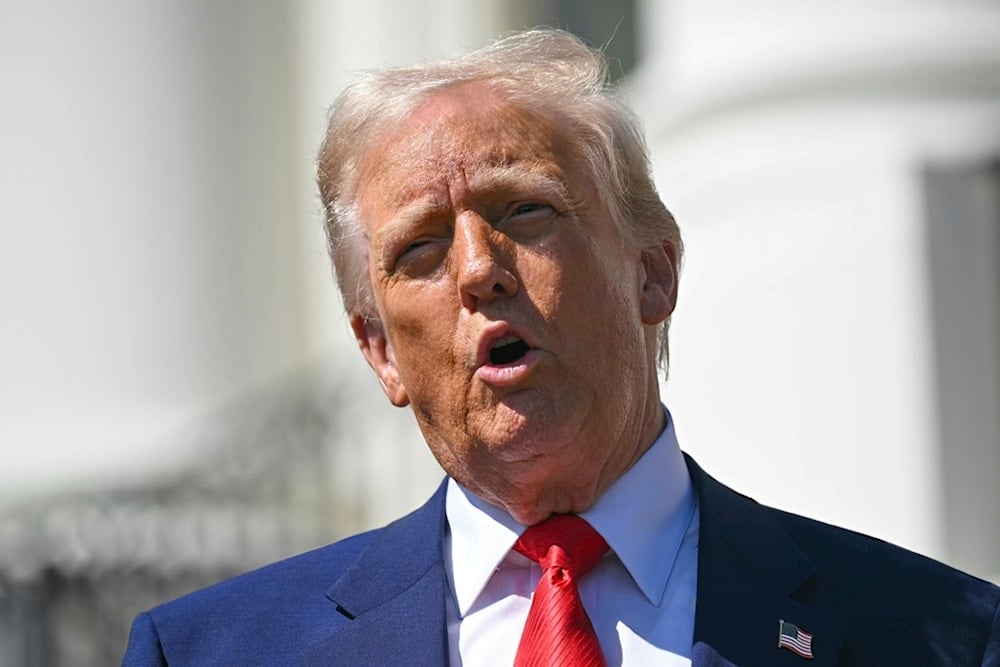Trump says 'China wants deal, does not know it yet'
Trump commented on the possibility of reaching an agreement with Beijing, suggesting that China is interested in negotiations but struggling with how to proceed.
-

President Donald Trump speaks during an event with auto racing champions at the South Portico of the White House Wednesday, April 9, 2025, in Washington, DC, the United States. (AP)
US President Donald Trump on Wednesday described China as the "biggest abuser" in trading history, accusing Beijing of profiting heavily at America's expense. Speaking to reporters at the White House, Trump said China made $1 trillion off trade with the United States in 2024, a situation he called "not right."
"China was by far the biggest abuser in history," Trump stated. "A deal can be made with every one of them. A deal is going to be made with China. A deal is going to be made with every one of them. And there'll be fair deals. I just want fair deals," he added.
Later, Trump said he is open to meeting with Chinese President Xi Jinping, calling him a "friend."
"Sure, I’d meet with him [Xi]," Trump told reporters. "He's a friend of mine. I like him, President Xi, I like him. I respect him."
Earlier in the day, Trump announced a sharp escalation in his trade policy against China, increasing tariffs on Chinese goods to 125% effective immediately. The move followed Beijing’s decision to retaliate against previous US tariffs by imposing an additional 50% duty on American goods.
'China wants to make a deal'
Trump also commented on the possibility of reaching an agreement with Beijing, suggesting that China is interested in negotiations but struggling with how to proceed.
"China wants to make a deal. They just don't know how quite to go about it. It's one of those things. They are quite proud people, and President Xi [Jinping] is a proud man. I know him very well, and they don't know quite how to go about it, but they'll figure it out in the process of figuring it out," Trump said.
The tariff hike marks another significant escalation in the ongoing US-China trade tensions, even as Trump maintains that fair agreements are still achievable.
Trump hikes tariffs to 125%
Trump announced on Wednesday a sudden and drastic increase in tariffs on Chinese imports, raising them to an unprecedented 125% effective immediately. The announcement came after China responded to previous American tariff hikes with reciprocal measures of its own.
"Based on the lack of respect that China has shown to the World's Markets, I am hereby raising the Tariff charged to China by the United States of America to 125%, effective immediately," Trump wrote on his Truth Social platform.
This escalation follows a series of aggressive tariff increases by Washington over recent months—starting with a 10% hike in February, rising to 20% in March, and reaching 54% earlier in April. In response, China imposed its own tariffs, climbing to 84% by April 9. Rather than pursuing meaningful dialogue, the US administration has continued to inflame tensions with punitive economic measures.
Fed warns tariffs to raise inflation
Federal Reserve officials have expressed concern that the US administration's tariff-heavy trade strategy, particularly its latest escalation against China, could undermine economic growth and fuel inflationary pressure.
St. Louis Fed President Alberto Musalem, speaking to Reuters, warned that US economic growth is likely to fall "materially below trend" due to new import tariffs and other economic headwinds. He also described as "risky" the assumption that tariff-driven price increases can be dismissed as short-term effects.
Minneapolis Fed President Neel Kashkari, addressing the Detroit Lakes Chamber Economic Summit, echoed that view, cautioning that treating inflation from tariffs as a one-off could leave policymakers vulnerable to more persistent price pressures.
"The escalating trade tensions between the United States and China pose a significant risk," Musalem said, adding that inflation appears more persistent than previously expected. Kashkari reinforced this position, warning that failing to address the inflationary impact of tariffs may result in monetary policy errors.
The minutes from the Fed's March 18–19 meeting revealed that policymakers were already anticipating a difficult balancing act—managing inflation while also addressing the slowdown in growth that could raise unemployment.
Federal Reserve Chair Jerome Powell acknowledged this challenge, stating in recent remarks that the economic impact of the tariffs appears more substantial than initially anticipated. He signaled that interest rates are unlikely to be lowered in the near term, as the central bank monitors incoming data closely.

 4 Min Read
4 Min Read










